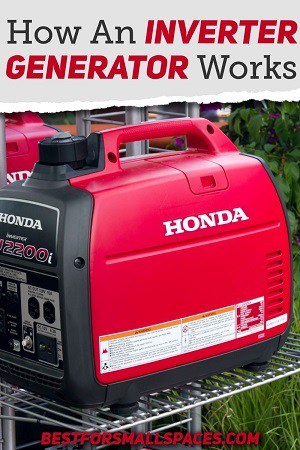
Before you go camping, to the next tailgate, or are traveling on a cross-country trip you might want to consider bringing a generator with you. Surprisingly, not all generators are big and clunky and some will fit easily in the backseat of your car; these are the inverter generators.
In this article, we will look at how an Inverter Generator works. We will also compare an Inverter Generator with a conventional generator, to find any differences and advantages.
Also, check out our small generator reviews article to see which Inverter Generators made it on to our best of list.
What is an Inverter Generator?
An inverter generator is a small, portable generator. Unlike other generators deemed “portable”, an inverter generator is usually small enough to carry by hand.
Surprisingly for their small, compact size these generators are generally quite expensive, costing hundreds if not thousands of dollars. However, they produce a lot more power than similar conventional generators.
How do Inverter Generators Work?
The video below provides a good example of how inverter generators work, even if it’s trying to sell its own brand.
All generators work using either gasoline or another combustible fuel source, converting that fuel into electrical energy. In function, they are similar to a power plant but on a much smaller scale.
The engine, also called a motor, uses the fuel to power the alternator, which then produces the electricity.
Inverter Generators work the same way, except instead of producing AC power right away they convert it firstly into DC power and then “invert” it back to AC power, using on-board computers.
While this is occurring, the generator will “throttle” its motor to make sure that enough energy is produced to meet demand, but no more. This is what being “idle” means for these generators.
What are the Advantages of an Inverter Generator?
The most notable advantage of an inverter generator is the size. Small enough to carry and doesn’t take up much room, inverter generators are perfect for people that enjoy camping, RVing, boating, off-roading, or any other activity that would require a small, portable generator.
Due to the way that these generators function, inverters are noticeably quieter than their conventional counterparts. This is due to the use of more electronics than conventional generators. Although this will raise the price significantly, it does provide a plethora of benefits.
Along with being small and quiet, inverter generators are much more fuel efficient as they use an idling mechanic as previously mentioned.
Some inverter generators, like the Champion Models seen in the video, offer other functions, such as producing cleaner power, along with the ability to hook up to other generators for more power.
Here are some other advantages:
- With fuel consumption being regulated, inverters are safe to use during disasters, blackouts, or other events where acquiring more fuel is difficult, if not impossible.
- With less noise produced by an inverter generator, they can be used at concerts, sporting events, family gatherings, and a wide variety of activities, without drowning out any music or conversations. Unlike conventional generators, an inverter won’t damage delicate electronics with its noise.
- Because of its small size, it is a real space saver. It is very useful to store in the trunk of a car, just in case car trouble arises. Taking up little room, other valuables and essentials can be packed with it.
- While the claim of producing “cleaner” energy might be disputed, the smell it produces is much better than conventional generators.
What is the Difference Between an Inverter Generator and a Regular Generator?
Conventional and inverter generators do have many similarities. They both require a combustible fuel source to function. Also, both use motors and alternators to produce electricity. And both come in a variety of sizes and shapes with varying power output.
Invertor Generators are more Energy Efficient
The key difference is that a regular generator uses mechanical alternators, converting the power to AC. They also run automatic, producing the same energy output regardless of what’s being used.
As previously mentioned, Inverters convert and then invert their energy and ensure that only a certain amount of energy is used depending on the task.
Invertor Generators are Quieter
Conventional generators are also louder compared to an inverter generator, with larger models easily drowning out all other sounds.
Invertor Generators are usually more Expensive
Then there is the cost difference. Conventional generators, depending on the size and power output, are significantly cheaper than the pricier inverters of similar size and output.
Make sure to check out our small generator reviews, to find out which type of generators made it on our best small generators list.






